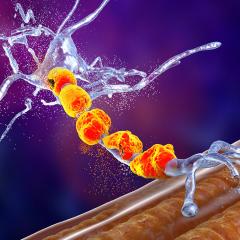Motor Neurone Disease (MND)
What is MND?
Motor neurone disease (MND) is a rapidly progressing neurological disorder that attacks the nerve cells in the brain and spinal cord controlling the way we walk, talk, eat, speak, and breathe. The loss of these nerve cells (motor neurons) leads to progressive muscle weakness and wasting.
MND, also known as amyotrophic lateral sclerosis (ALS) or Lou Gehrig’s disease, is different for everyone; the needs of MND patients are complex and vary from person to person. MND may start in different areas of the body and progress in different patterns and rates. The disease often does not become evident until many nerve cells have died. The path to diagnosis can be a long one, and the average time from the onset of symptoms to diagnosis can range anywhere between 10 to 18 months. For most patients, the average life expectancy after diagnosis is 27 months. There is no known cure or effective treatment to reverse the effects of MND or to prevent it from progressing.
What causes MND?
The causes of MND are currently unclear but the generally accepted view is that this disease is a result of a combination of environmental, lifestyle and subtle genetic risks. About 5-10% of MND patients have a known family history of MND. The remaining cases (90-95%) are sporadic.
How is MND treated?
In MND, a multi-disciplinary team provides coordinated care tailored to the needs of each patient. Although there is currently no cure for MND, the drug riluzole (sold as Rilutek or APO-Riluzole) is approved in Australia for people with MND. Riluzole cannot cure MND, but for some patients, it can slow the progression of the disease and prolong survival by two to three months. Riluzole is available at a subsidised price on the Pharmaceutical Benefits Scheme, and it is best to discuss treatment with a neurologist.




